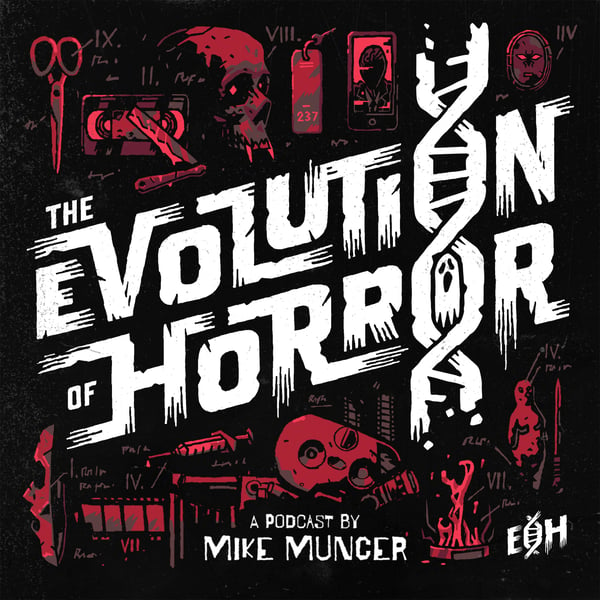BONUS EP: A Brief History of Horror Music with Neil Brand
The Evolution of Horror
Mike Muncer
4.8 • 1.7K Ratings
🗓️ 24 September 2017
⏱️ 55 minutes
🧾️ Download transcript
Summary
Happy bonus horror treat! Here's the full, uninterrupted chat with film musician / composer / historian Neil Brand about a history of horror scores. From Nosferatu through to Under The Skin, we cover the trends, the traits and the evolution of the horror score over the last one hundred years. ENJOY!
Neil Brand is a film historian, musician and composer. You can find details of his upcoming events at http://www.neilbrand.com/ or follow him on twitter: @NeilKBrand
Mike Muncer is a TV & Podcast Producer and Film Journalist. You can find him on twitter: @TheMovieMike
He also produces and co-presents another film podcast with Rhianna Dhillon called Back Row: https://backrowpodcast.net
Thanks for listening, tune in next week for our GIALLO special. Mike will be joined by Dan Martin from the Arrow Video Podcast, as well as special guest ALAN JONES. Until next time...
Dracula (1958)
Dir: Terence Fisher
Music by James Bernard
Courtesy of Hammer Films
Psycho (1960)
Dir: Alfred Hitchcock
Score by Bernard Herrmann
Courtesy of Shamley Productions
The Birds (1963)
Dir: Alfred Hitchcock
Score by Bernard Herrmann
Courtesy of Alfred J. HItchcock Productions
The Innocents (1961)
Dir: Jack Clayton
Courtesy of Achilles / Twentieth Century Fox
Halloween (1978)
Dir: John Carpenter
Music by John Carpenter
Courtesy of Falcon International Productions & Compass International Pictures
The Shining (1980)
Dir: Stanley Kubrick
Music and the Stars and You performed by Al Bowlly
Courtesy of Warner Bros. Hawk Films, Peregrine, Producers Circle
Deep Red (1975)
Dir: Dario Argento
Score by Goblin
Courtesy of Rizzoli Films & Seda Spettacoli
Suspiria (1977)
Dir: Dario Argento
Score by Goblin
Courtesy of Seda Spettacoli
Assault on Precinct 13 (1976)
Dir: John Carpenter
Score by John Carpenter
Courtesy of The CKK Corporation
Under The Skin (2014)
Dir: Jonathan Glazier
Score by Mica Levi
Courtesy of Film4, BFI, Silver Reel, Creative Scotland, Sigma Films, FilmNation Entertainment, Nick Wechsler Productions, JW Films, Canal+, Scottish Screen & UK Film Council
Star Wars: The Force Awakens (2015)
Dir: JJ Abrams
Score by John Williams
Courtesy of Walt Disney Studios / LucasFilm / Bad Robot
Jurassic Park (1993)
Dir: Steven Spielberg
Score by John Williams
Courtesy of Universal Pictures / Amblin Entertainment
Transcript
Click on a timestamp to play from that location
| 0:00.0 | Welcome back to the evolution of horror and to this very special bonus episode. |
| 0:09.4 | Now if you tuned into the most recent episode that came out on Friday, you may have heard a short snippet of my conversation with film composer and musician Neil Brandt. |
| 0:18.0 | I just wanted the chance to play you the entire conversation because we sat down and talked for nearly an hour about a sort of history of horror movie music |
| 0:26.4 | the sort of tropes the formulas the characteristics of a horror score and how they've changed and evolved over the last hundred years from |
| 0:33.9 | silent cinema through to now. It's a really really fascinating conversation. |
| 0:38.2 | Neil Brand is brilliant and there will be information about Neil his website his |
| 0:42.3 | music his events at the end of the |
| 0:44.2 | podcast as well. So please do listen through to the very end. But here is my |
| 0:49.0 | chat with the brilliant Neil Brandt. |
| 0:57.0 | Neil, welcome. Thank you. |
| 0:58.0 | Now Neil, I am a big fan of yours and of your music, |
| 1:00.0 | but for anyone who doesn't know, |
| 1:02.0 | please just tell me a little bit about what |
| 1:03.6 | you do well I started life really as a silent film pianist I was always |
| 1:09.7 | interested in how music worked with film and I could always play by ear and I fell into this very odd |
| 1:17.2 | specialist job back in the 1980s and learnt my trade in the National Film Theatre. But then in the last few years |
| 1:25.4 | that sort of expanded out to talking about film music in general and also I write and I have a kind of crusading zeal about cinema music in particular because |
| 1:40.4 | when I was growing up, formal music education basically meant that if you didn't understand |
| 1:46.6 | music you weren't supposed to understand what it meant either. |
| 1:51.9 | And the very idea of things like film music was sort of dismissed almost as being like |
| 1:57.4 | too accessible in some strange way. So part of my kind of ambition of the last 30 years has been to demystify the process of our music's working when he's telling a story. |
| 2:10.0 | Mainly because it occurred to me quite early on that when a director and a composer sit down together, |
... |
Please login to see the full transcript.
Disclaimer: The podcast and artwork embedded on this page are from Mike Muncer, and are the property of its owner and not affiliated with or endorsed by Tapesearch.
Generated transcripts are the property of Mike Muncer and are distributed freely under the Fair Use doctrine. Transcripts generated by Tapesearch are not guaranteed to be accurate.
Copyright © Tapesearch 2025.

